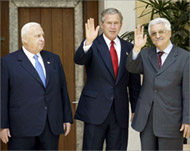Israel kills Hamas leader
Israel has assassinated a top-ranking member of the Palestinian resistance movement Hamas even as the Palestinian Authority continued to try and persuade the group to agree a ceasefire with the Zionist state.
 |
| Israel will not stop its extra- judicial killings of Palestinians |
Abdullah Kawasme, a top Hamas leader was assassinated by the Israelis in the West Bank city of Hebron on Saturday, Israeli military officials said.
Israeli Radio said he was shot dead by an elite army unit while trying to resist arrest. Witnesses said they saw soldiers shooting at a car in which Kawasme was reportedly trying to flee.
Kawasme was a Hamas leader in the West Bank. Israelis say he was responsible for a series of attacks, including last week’s bombing in Jerusalem, that killed 17 people.
His assassination comes as the Palestinian Prime Minister Mahmoud Abbas is desperately seeking to win over the support of the Hamas and other Palestinian factions for the US-backed peace road-map.
The Palestinian Prime Minister has been impressing upon the Hamas to stop their attacks on Israel.
Hamas however demanded that Israel must halt its policy of assassinations which pay little regard for the value of civilian life.
Israel attempted to assassinate another senior Hamas leader Abdul Aziz al-Rantissi only 11 days ago. They fired rockets at a car in which he was traveling, but the Hamas leader escaped with light injuries.
Kawasme’s death brings to 3,355 the number of people killed since the September 2000 outbreak of the Palestinian uprising.
Of them, 2,527 have been Palestinians and 768 Israelis.
Ultimatum
Earlier the Jewish state agreed to give Palestinians three weeks to prepare security forces for a crackdown on Palestinian resistance groups, a source from Israeli Prime Minister Ariel Sharon’s office said
Israeli occupation forces, however, would continue their extra-judicial killings in the Occupied Territories, the source said.
 |
| The US backed road map is struggling to pick up momentum |
“There would be no immunity for “ticking bombs”, he said about Palestinian resistance leaders who are targeted by Israel after it accuses them of planning to carry out military operations against it.
Palestinian officials did not immediately comment on the offer.
But the Palestinian Authority has long demanded Israel to stop assassinating resistance figures, saying such killings only strengthen the resistance groups.
The Israeli offer followed US Secretary of State Colin Powell’s visit on Friday to Israel and the occupied West Bank.
Powell’s trip to the region showed little sign of advancement of the US-sponsored “road map” plan.
Palestinian Prime Minister, Mahmoud Abbas, is trying to avoid a clash with resistance groups and is hoping to persuade them to sign a truce.
Abbas said after his meeting with Powell that no progress could be made if Israel did not stop its incursions and end its blockades of Palestinian territories.
Israel has rejected Abbas’s conciliatory approach.
“A truce is in itself a ticking bomb, so it cannot last in the long run”, Israeli Foreign Minister Silvan Shalom told Israel Radio.
“There cannot be a situation where the Palestinian extremists decide when this ticking bomb becomes a live and real bomb”.
But Palestinian security chief, Mohammed Dahlan, said in an Egyptian newspaper interview on Saturday that he would do his best to avoid divisions within Palestinian ranks.
“We will try in every way to avoid a Palestinian split which could lead to a civil war,” Akhbar Al-Yom daily quoted him as saying.
Palestinian reactions
Palestinian leader Yasser Arafat’s top adviser, Nabil Abu Rudaina, said Abbas had informed Arafat on the results of his meeting with Powell.
 |
| The Israeli occupation has forced Palestinians to take up arms |
Abu Rudaina described the meeting as “significant”, but said US and international efforts should increase to force Israel to implement the “road map”.
Palestinian Foreign Minister Nabil Shaath said the talks between Abbas and Powell were positive.
But Palestinian legislator Saeb Erakat said the meeting was “disappointing”, saying the Quartet should set forth a compulsory mechanism for the implementation of the “road map”.
The Quartet, which devised the peace plan, includes the United States, Russia, the European Union and the United Nations.
Erakat also said there should be timeframes for implementing the steps in the plan.
Powell’s visit will be followed by another trip to the region by US national security adviser, Condoleezza Rice, next week, Palestinian and Israeli officials said.
But Israeli foreign ministry spokesman, Yonathan Peled, said US officials had informed his ministry of “Rice’s intention to visit the region next week, but there was no mention of a specific date”.